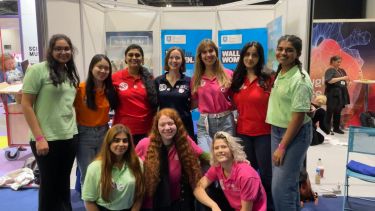Meet Garima - “Extracurricular activities have added greatly to my university experience, making it wholesome and multifaceted"

Why did you choose to study Electronics and Computer Engineering?
It was a mixture of fascinating documentaries like ‘Particle Fever’ and my interest in physics, mathematics and computer science at school that first got me interested in STEM. Whilst one can study these wonders by pursuing natural sciences, it is engineering that often enables their discovery and inventions for a better life by clever use of existing knowledge. It is fascinating to see how the electronics that we see ubiquitously are engineered from the semiconductor level, up to the component, circuit and systems level.
I chose to pursue Electronics and Computer Engineering as it gives me a well-rounded understanding of electronics, computer hardware and software engineering, enabling me to apply my favourite subjects in an engineering sense.
What have you enjoyed most about your course so far?
Definitely the labs! Labs are challenging in their own way but offer a brilliant opportunity to develop a wide range of hands-on skills. The university has a well-equipped electronics and control lab, and a cleanroom facility. The labs have allowed me to learn how to solder, use a variety of equipment (such as oscilloscopes, waveform generators, DMMs), build circuits on breadboard, perform circuit simulations on LTspice and even fabricate a Schottky diode in the cleanroom! Apart from being fun, labs are a great way to gain a more intuitive understanding of the course material.
What advice would you give to a younger student considering studying your course at university?
Electronics and Computer Engineering is a broad discipline, encompassing analogue and digital circuits, semiconductor physics, hardware and software programming, computer architecture, AI, and even hands-on circuit building and testing skills. The university provides some finance, law and management modules as well. Computer Engineering is a lesser-known, but rapidly growing field which opens a plethora of fantastic career opportunities.
Whilst the degree course requires considerable commitment, don’t hesitate to participate in extra-curricular activities; they add great value to your university experience and help build interpersonal skills. There are a lot of opportunities at the university for this – student projects, over 350 student societies, university ambassador roles, and even learning languages (for free!). At the same time – engaging in too many extracurriculars may leave you with too less time to work on your course – so be mindful of the balance, and don’t overload yourself with a lot just at the beginning of the semester.
The professors are very approachable and highly knowledgeable in their fields of research, which makes the learning experience very insightful and enjoyable.
Garima Malhotra
MEng Electronics and Computer Engineering student
Why did you choose to study at Sheffield?
Sheffield is a prestigious Russell Group university, and is ranked amongst the top universities in the world. The MEng Electronics and Computer Engineering course is IET accredited and meets all the academic standard requirements for Chartered Engineer (CEng) status as well. Moreover, scholarships such as the International Undergraduate Merit Scholarship alleviated much of the financial burden associated with studying abroad, making the University of Sheffield my top choice.
What are the best things about studying in your department?
Relevant modules are taught in a very engaging way, making the best use of video lectures, in-person lectures, quizzes, problem classes, labs and assignments. The professors are very approachable and highly knowledgeable in their fields of research, which makes the learning experience very insightful and enjoyable.
Moreover, the department provides exclusive study spaces, well-being sessions and even employability events (with EEE-specific mock interviews, CV checking and industry talks), providing constant support throughout one’s time at university.
What did you like most about the city of Sheffield? Has your time at Sheffield met your expectations so far?
Sheffield has a relaxed and green environment with an inclusive and international atmosphere. Living costs are very reasonable in Sheffield, especially compared to some of the other bigger cities in the UK. Sheffield has the pros of a city, without being too busy, along with the Peak District right around the corner. Sheffield also has a lively city centre and an active night life. I am very satisfied with my living experiences here so far.
Have you used any of the careers support services run by the university?
The careers support services helped me a lot in getting my first internship! I received helpful guidance on writing my CV via CV writing workshops and 1-to-1 appointments with experts. These sessions helped me improve and customise my CV for the different internships that I wanted to apply for.
The eMentoring program linked me up with an industry mentor who helped me gain invaluable insights into time management, career planning, and even preparing for job interviews.
Are you in any student societies? What do you enjoy most about these activities?
I have been a member of the Women in Engineering Society at the university since my first year and was the Vice President for this academic year. The society brings together women (students and professors alike from Sheffield and other universities), building a sense of community through our socials, podcast and blog, providing support through mentoring schemes, workshops, industry visits and inspirational panels, and doing a lot of outreach and volunteering for the cause of improving inclusivity in the engineering sector. It is great to be surrounded by a community of such inspiring women. I especially enjoyed recording podcast episodes in the university’s podcast booths, which I never expected to do during my time at university!
I am also a part of the Sheffield Engineering Leadership and Service Award (SELSA) cohort at university, where I get to attend exclusive workshops, lectures, conferences and site visits on engineering, project management, leadership and Equality, Diversity and Inclusion.
I have also been learning German at university (for free!) with the Modern Language Teaching Center (MLTC) since my first year and have recently obtained A2 proficiency in the same. It is a fun break from daily university studies, whilst also expanding my career opportunities into German-speaking countries.
These extra-curricular activities have added greatly to my university experience, making it wholesome and multi-faceted.
Where do you see yourself in the future?
After university, I want to gain some industry experience, working as an electronics, computer, or software engineer, probably for scientific research purposes. Later, I might even pursue a PhD in a topic that I find gripping. I also want to keep learning languages and improve my knowledge of different cultures around the world.



